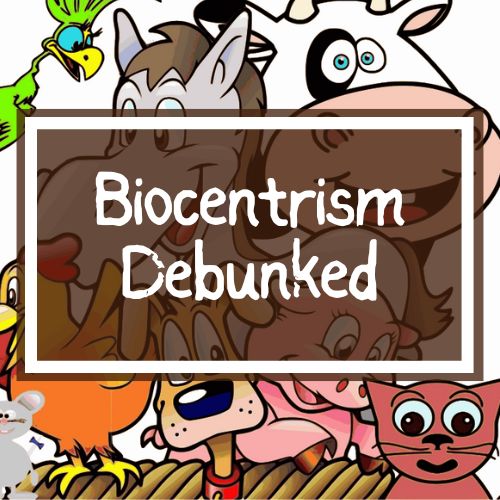Biocentrism is a philosophical concept that posits the intrinsic value and moral standing of all living organisms. According to biocentrism, all living beings have an equal right to exist, and humans are not superior to other forms of life. While this idea has gained some popularity in recent years, it remains a subject of intense debate and scrutiny. In this article, we aim to critically examine biocentrism and present arguments that challenge its validity.
Biocentrism Debunked
Biocentrism, as a theory, has faced substantial criticism and skepticism from various fields of study. Let us explore some of the key points that debunk the claims made by proponents of biocentrism.
Lack of Scientific Evidence
One of the primary criticisms against biocentrism is the lack of substantial scientific evidence to support its claims. While biocentrism may have philosophical and ethical foundations, its proponents often fail to provide empirical data that convincingly demonstrates the theory’s validity. Without concrete evidence, it becomes challenging to consider biocentrism as a scientifically sound concept.
Inconsistent with Evolutionary Biology
Another crucial point of contention arises when we consider the principles of evolutionary biology. Biocentrism, with its emphasis on the equal value of all life forms, contradicts the fundamental principles of natural selection and survival of the fittest. Evolutionary biology suggests that species evolve through competition and adaptation, and some species are naturally more dominant than others. Biocentrism’s assertion of equality among all life forms runs counter to this well-established scientific framework.
Anthropocentric Bias and Human Necessities
Biocentrism advocates for the equal moral worth of all living beings. However, critics argue that this perspective neglects the reality of human necessities and the anthropocentric bias that exists within society. While acknowledging the importance of environmental preservation, it is essential to consider the needs and well-being of humans, who are an integral part of the ecosystem. Biocentrism’s exclusive focus on non-human life forms may undermine human interests and the overall balance of the ecosystem.
Contradictory Ethical Implications
The ethical implications of biocentrism can be complex and contradictory. While the theory aims to promote compassion and respect for all living beings, it raises difficult questions when it comes to practical decision-making. For instance, in situations where human life is threatened by other species or where conservation efforts conflict with human progress, how should society prioritize competing ethical considerations? Biocentrism provides no clear guidelines for addressing these ethical dilemmas.
Lack of Consensus in the Philosophical Community
Even within the philosophical community, there is no consensus on the validity of biocentrism. Different schools of thought present diverse perspectives on the ethical treatment of non-human life forms, and biocentrism is just one of many competing theories. The absence of widespread agreement among philosophers further casts doubt on the soundness of biocentrism as a universally applicable ethical framework.
FAQs about Biocentrism Debunked
1. Is biocentrism considered a scientific theory?
No, biocentrism is not widely recognized as a scientific theory due to the lack of empirical evidence supporting its claims.
2. Can biocentrism coexist with the principles of evolutionary biology?
Biocentrism contradicts the principles of evolutionary biology, which emphasize the role of competition and adaptation in shaping species. Thus, the two perspectives are often seen as incompatible.
3. Does debunking biocentrism undermine the importance of environmental conservation?
Debunking biocentrism does not diminish the significance of environmental conservation. It simply challenges the notion of equal moral standing among all life forms and emphasizes the need to consider human interests alongside the preservation of nature.
4. Are there alternative ethical frameworks that address the complexities of human-nature relationships?
Yes, several alternative ethical frameworks, such as ecocentrism and anthropocentrism, offer different perspectives on the ethical treatment of non-human life forms and human-nature relationships.
5. Can aspects of biocentrism still be valuable in shaping our ethical understanding?
While the overarching claims of biocentrism may face criticism, certain aspects, such as promoting compassion and respect for nature, can still be valuable in shaping our ethical understanding and environmental consciousness.
6. Is biocentrism a widely accepted ethical framework?
Biocentrism is not universally accepted as an ethical framework. The philosophical community remains divided on the subject, with various competing theories and perspectives.
Conclusion
Despite its appeal to proponents of environmental conservation and animal rights, biocentrism faces substantial criticism and skepticism. The lack of scientific evidence, inconsistencies with evolutionary biology, anthropocentric bias concerns, contradictory ethical implications, and lack of consensus within the philosophical community all contribute to the ongoing debate surrounding biocentrism. While it is important to recognize the intrinsic value of nature and non-human life forms, alternative ethical frameworks provide a more nuanced understanding of human-nature relationships. By critically examining biocentrism, we can engage in a more informed dialogue on how to best address the complex ethical challenges we face in our interactions with the natural world.




